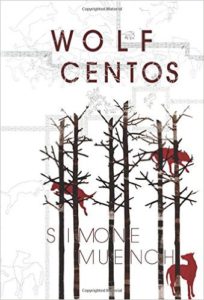Wolf Centos
 by Simone Muench,
by Simone Muench,
Sarabande Books, 2014,
66 pages, paper, $14.95,
ISBN: 978-1-936747-79-5
Buy this Book
The ancient form of the cento provides a beautiful excuse for us to revel in the poetic line and in the craft of our literary forbears: named for the Latin word for a patchwork cloak, the cento calls for its creator to piece together individual lines from the works of other poets. In Wolf Centos, Simone Muench assembles an entire collection of these patchwork poems, all in service of one common, evocatively wild object of meditation: the image and symbol of the wolf.
Muench draws upon a pantheon of greats for her lines — from Akhmatova to Yeats, Atraud to Jake Adam York — and a natural first instinct is to try to identify each author, to deconstruct Muench’s cloaks back to their original fabrics. (“Sans teeth, sans eyes” — Shakespeare. “I shall speak not of myself, but of geography” — Neruda.) Soon, though, we come to focus less on the source of each line than the textures, colors, and music for which Muench chose it, and she’s plucked some striking ones. But the cento’s real art lies not just in choosing individual lines, but in arranging them: we look for the flow or leap between lines, for resonance or juxtaposition, for how the assembled pieces build and sustain meaning and momentum. Do the patches not only create a new whole, but transcend their piecemeal sum? At their best, Muench’s stanzas turn with luminous, startling clarity:
I take a wolf ’s rib & whittle it
into little months, little smokes
& oblivion.
And here, relish the tinged tactility of Muench’s piecework:
The theory
of light is broken: the room dark
as black mullein, a clutch
of burnt paper. Every face a stain.
Muench wisely breaks up her volume of centos — each of which is titled “Wolf Cento” — into four sections. The first section’s epigraph, from the screenplay of The Doors, is delivered with a playful deadpan directed at Jim Morrison’s wife (“All the poetry has wolves in it, Pam.”); the next one is from T. S. Eliot: “These fragments I have shored against my ruins.” Her use of Eliot suggests that such an archaeological act as the crafting of a cento is not just creative, but survivalist.
Over the progression of her four sections, Muench offers a range of variations on what the wolf might mean to us. Wolves seem sometimes to represent an inner human strength, something ancient and feral: “In the space of a half-open gold door / your body’s animals want to get out.” Other times, the creature is a strange Other that we both fear and envy from a distance: “We: spectators, always, everywhere . . . / we wanted to be wolves.” In or around the wolf there is also a human love, a lust (“Eros is a wolf, Caesar”), a loss. The wolf reminds us of our human limitations (“More & more I see the human form, / a nothingness which longs to be the sea”), but Muench also reminds us of the possibility for communion, and for transformation thereby:
“I have lost my being in so many beings.” Finally, the wolf presents the possibility of salvation, a way to save our wildness in the face of loss, civilizational clutter, and time: “Shrewd wolf of dark innocence, / rouse us from blur. Call us.” We are encouraged to consider the wolf in the spirit that Stevens asked we consider the blackbird: “The question of the wolves turns and turns.”
In a project of such singular focus, some missteps and weaker moments are inevitable. Given dozens of “wolf” lines culled from the canon and beyond, some are bound to court wolf-cliché (“we licked the blood from our paws”), and Muench’s lines sometimes just feel like a patchwork of good lines. And, over time, despite the pacing device of the section titles, the book’s momentum flags a little, and it isn’t helped by the continually reiterated “Wolf Cento” at the top of each page.
But at its best, Muench transcends the centuries and continents she spans. Reading Wolf Cento offers not only myriad gleams of beauty and strangeness, but also the comforting sense of submerging in a rich collective consciousness of what we’ve written. The result is sometimes diffuse, dizzying, not to be read for literal coherence. Read these poems instead like meditative mysteries, as one reads the cumulative couplets of a ghazal. Delight in this evidence that our works and days — and our best lines — can be woven and rewoven into so tangible a pleasure. Praise the luxury of inheriting so many good ones.
— Megan Grumbling

